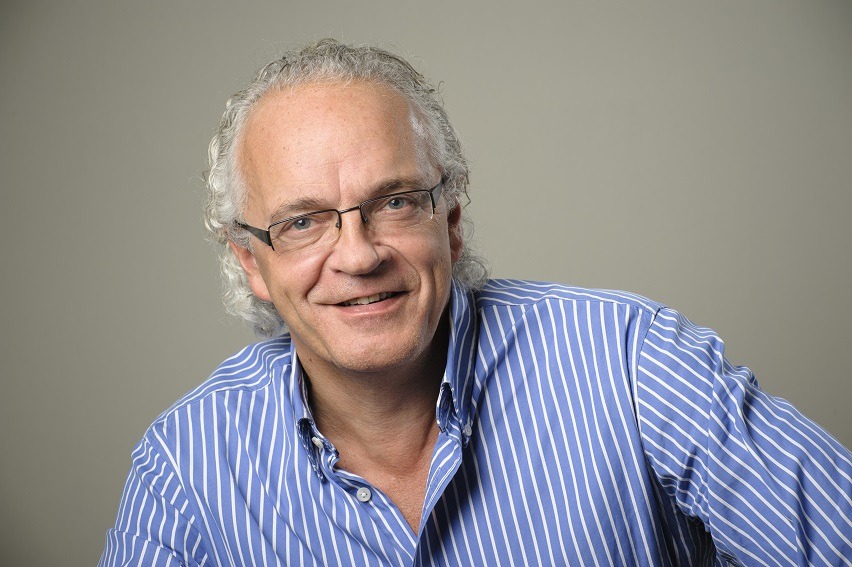Once every few weeks Prof. Dr. Marc Noppen sits down with patients at his hospital and chats about how it can improve its services. Accompanied by the communications manager at UZ Brussel, Marc chews the fat over drinks and an informal dinner.
“It is a way of finding out how we might improve things here,” says Marc, the hospital’s Chief Executive Officer.
“Quite often,” he says, “we get some great ideas from patients, which we endeavour to put into practice.”
The get-together over dinner with patients, who are usually suffering from chronic diseases and frequent attendees at UZ Brussel, is but one example of the hospital’s patient-friendly policy.
“We launched the patient dinners some time ago, as part of our efforts to get as much input from patients as possible,” says Marc. “They have gone very well.”
He personally places great emphasis on the concept of “patient empowerment,” which he defines partly as encouraging patients to take greater ownership of their own physical welfare.
The hospital has also become a pioneer in several specialities, notably in the field of infertility.
Marc says there has been an increase in people in Belgium with fertility problems and believes this is due to various reasons, including diseases such as diabetes and obesity, which are linked to “lifestyle” issues.
The Centre for Reproductive Medicine (CRG) at UZ Brussel focuses on research into and treatment of infertility in men and women.
It has pioneered advances in reproduction techniques and their application and in doing so has won itself a worldwide reputation. In its first 25 years, over 15,000 babies have been delivered following their parents’ treatment at the UZ Brussel centre.
Its fertility clinic – which Marc calls the hospital’s “signature” service – is recognised as arguably the best in Europe. Medical assistance is not limited to IVF or other fertility techniques, such as hormone treatment or artificial insemination. It also extends to related reproductive complications, including hereditary defects of the parents.
As well as fertility, UZ Brussel also has an excellent reputation in other fields, including its centres for cardiovascular disease, medical imaging, reproductive medicine and diabetes.
The European Face Centre, which provides pioneering plastic surgery treatment, is also based at UZ Brussel.
The hospital has also been praised for its work in tackling obesity, a massively growing problem in Western Europe. In Belgium, about 15% of the population suffers from obesity and the incidence increases to 25 to 30% among those aged 55 or more.
As Marc points out, obesity is caused by many contributing factors and the emphasis is on helping patients lose sufficient weight “in a sustainable manner.”
The clustering of resources and knowledge, another feature that sets the hospital apart from lots of others, has led to the creation of spearhead centres at UZ Brussel, with each boasting a combination of disciplines.
Photo Credit: Bart Moens
Under Marc’s leadership, UZ Brussel has also happily embraced many new technologies.
He adds, “There has been major investment over the years in this area, and we have some state-of-the-art equipment, which, of course, can only be a good thing for patient care.”
As well as delivering first class patient care, UZ Brussel also serves as a teaching and training centre, which, as Marc points out, are all fundamental to medicine.
Research, for example, can lead to the development of new or improved medication or more effective remedies against certain diseases.
The hospital also provides tuition to students aspiring to become healthcare professionals, such as physicians, nurses, pharmacists, physiotherapists and welfare workers. Due to its location in the Brussels region, the hospital is oriented towards the international healthcare landscape as well as towards patients.
But one area of concern for Marc is the seemingly never ending round of budget cuts afflicting healthcare in Belgium, a problem he fears is likely to continue in the years to come. It is one of the main challenges facing not just UZ Brussel but many of the other 100 hospitals in Belgium, he says.
University hospitals generally receive insufficient financial support to undertake their key tasks.
It’s why university hospitals like UZ Brussel welcome support of all kinds. This can range, for example, from devoting some spare time to helping some of the hospital’s activities, to providing financial support either to the hospital generally, or for a specific project.
With its 700 beds, UZ Brussel admits more than 25,000 patients annually and treats 400,000 outpatients, both from Belgium and other countries.
As with other hospitals, some of these patients express their gratitude, for the excellent care they received, by making a donation, something that is always welcome of course.
One area of particular pride for Marc is the fact that all UZ Brussel patients are assured that they will almost certainly be addressed in their native language.
“We have no less than 70 nationalities working here, which means that we can speak to patients not only in the official language (Dutch) but the patient’s language as well,” he asserts.
He is also proud of the absence of any “hierarchy” at UZ Brussel where, he says, everyone from the caretaker to the CEO is treated the same way.
Looking to the future, Marc believes that his pet policy of patient empowerment will help keep UZ Brussel ahead of the game.
“We already have apps and patient portals, and these have proved very popular, especially with younger patients. It’s the future,” says Marc, who, as well as heading up a hospital, which is the size of a major company, also lectures at Vrije Universiteit Brussel (Free University of Brussels).
When asked how he sees healthcare developing in this country in the coming years, he pauses for a moment, and says, “I think we need to concentrate in the future more on prevention rather than just ‘fixing’ things, as is the case at present.”
By Martin Banks
The Brussels Times

